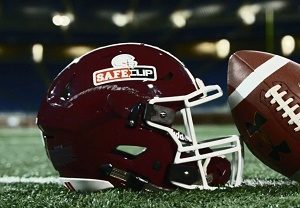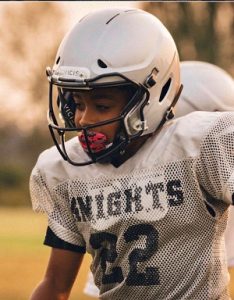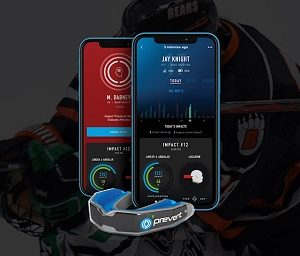Affording the Latest in Football Equipment: A Car Raffle Is The Ticket!
Contrary to what many in the mainstream media may have led you to believe, tackle football is safer today than it has ever been.
While by no means risk free, research suggests that limits on full-contact practices, education of parents, athletes, athletic trainers and coaches about the signs and symptoms of concussion and the dangers of continuing to play with concussion, implementation of conservative removal from and return to play guidelines and technological advances in safety equipment can reduce the risk to athletes of long-term brain injury from concussion and repetitive head impacts.
As readers of MomsTEAM/SmartTeams and viewers of our PBS documentary, The Smartest Team, know, I have dedicated much of my time over the past two decades to promoting these safety measures. As an important part of that effort, I have worked with youth and high school football programs across the country to equip players with the most technologically advanced football helmets and impact sensors.
I have always come away impressed with the efforts of equipment manufacturers to make the sport safer, but I also know that increased safety comes at a cost, leaving many youth and high school programs – and the parents and booster clubs which support them – in a quandary: wondering on the one hand how they can afford to buy expensive new helmets and impact sensor systems for their players, and on the other, how they can afford not to.
I first encountered this dilemma twenty years ago when my son Spencer was playing football in middle school. One day in the spring of his sixth-grade year, he brought home a letter from the coach stating that, because of cuts to the school’s budget, he would be unable to replace the 100 or so worn out helmets the team needed, so that the program would have to be cancelled for the coming fall season. Spencer and his friends who anticipated playing in the middle school were devastated. I recall Spencer, close to tears, asking me if I could “talk to the coach to change his mind.”
Instead, I asked coach how much money he needed to save the program. He said he needed about $30,000 to cover the cost of 100 new helmets and repainting and reconditioning the helmets before the next two seasons. Remember: this was 1998, so in 2019 dollars, he would have needed between upwards of $60,000 for the same 100 helmets. And that’s only for the helmets. These days, football programs are not only looking at the cost of expensive new helmets (such as the new Vicis Zero1 helmets (top-rated by the both the NFL and Virginia Tech ), but impact sensors, such as the Prevent Head Impact Monitor, and the S.A.F.E. Clip – a little shock absorber to replace the plastic breakable clips that attach to the facemask to the helmet.
So I rolled up my sleeves and got to work on a fundraiser to come up with the money needed to save the middle school program.
Car Raffles: Proven Fundraisers
First and foremost, you need to have a pressing need for something safety related such as new helmets, impact sensors, etc.
Car raffles are the best way to raise a significant amount of money quickly. People need cars. Kids and their parents love the teamwork and enthusiasm raffles generate. Winning an expensive car for a $100 donation with great odds is unbeatable as a fundraiser. I have run five car raffles, raising between $25,000 and $50,000 for each raffle within an eight-week time frame, all before the year 2000 and all without the help of technology. Here’s the blueprint I used which has worked with dozens of organizations I have shared it with.
Case Studies
- The first car raffle I ran was for my children’s preschool in Connecticut back in 1985. The school needed to raise funds to pay off the mortgage on their property. We raffled off 500 tickets at $100 apiece for a basic Mercedes Benz 190 (what they used to call a “baby” Benz). We raised $50,000 and netted $30,000 after paying the dealer $20,000 for the car.The raffle was a huge success and demand was high (we sold all 500 tickets within three weeks), so we added a second car to raffle immediately after. The Greenwich car dealership agreed to add a second car and to take a cut in their cost in exchange for the great publicity they were getting. Printing, fees and graphic design work were donated. We made a total of $60,000 for the school, tax free, all in six weeks, which paid off the mortgage on the school.
- The second raffle I ran was for the 100 middle school helmets for Spencer’s middle school program. We located a Jeep dealership close to our school in Massachusetts. They were willing to give us a Jeep Grand Cherokee at cost. I used the same blueprint: we sold 500 tickets for $100. We brought in $50,000 in six weeks. After expenses we had $27,000 to buy the helmets and donate them to the school. The program was saved!
- Two years later, son Spencer was in high school and the football team needed strength equipment and helmets. Again, I put together a team of six parents to help me and we duplicated the outcome of the first raffle I ran. We intended on running one raffle but ended up raffling two Jeep Grand Cherokees because the demand and interest was there three weeks into it. We made close to $60,000 for the football program that year.
Proven Blueprint
- Read and understand your state or commonwealth’s raffle laws. Each has a different set of policies and procedures. How much are the filing fees if any? Do ticket sellers in your state need to be older than a certain age? Does the raffle need to be run through a 501(c)(3)? What are the taxes that need to be paid by the winner or can they be absorbed by the seller? Etc. It will be helpful to ask an attorney to join your group as an advisor. Tax attorneys can be most beneficial and most will work pro-bono.
- Check your local municipalities policies, procedures and filing fees in the town where you will be running the raffle. Anyone, from Anytown, USA can buy raffle tickets, but you will be selling in one particular town/city that has their own set of rules. For example: some states won’t let you sell tickets on Sundays and holidays. Some won’t let you sell in front of places of worship, etc. Raffle laws are strictly enforced. I know of one group who had to stop selling tickets completely because they violated many of the easy-to-follow rules. It a real mess but they succeeded the next year.
- Run the raffle through a non-profit organization. Most school booster and sports clubs are set up as 501(c)(3) so this is usually an easy requirement to meet. Before going any further, you will need to partner with one (local boosters club, churches, etc.) and you’ll also need to check with the school to determine if your funds can go to your designated sports program. Be forewarned that some schools prohibit groups from fundraising for a specific team. I address ways to get around this below.
- Recruit a team. Enlist a task force of 6-8 adults (usually parents) who are determined and dedicated to raising the designated funds for a specific need. I found it invaluable to have people on my team with banking, legal, sales, design and public relations expertise. Each person should volunteer for about a ten-week time frame.
- Calculate your needs and expenses. I will cover this below, you’ll need to have a solid understanding about any challenges early on. I hope by reading my article thoroughly there will be no surprises. During your first meeting have your team put together a list of people in your community who will help make the raffle a success. Identify folks such as the car dealership, media personalities, store owners (who can donate things like helium balloons, etc.) This will help defray all costs.
- Set a very short time frame to sell the tickets. I think six weeks is ideal for selling the tickets. There needs to be an urgency declared; “First come first served – get your ticket(s) before they are all sold” should appear on all marketing materials. There are many people/companies who will buy 2, 3 or more tickets and there are others who go in together and ‘split’ the price with intent to sell the vehicle if they win. A good strategy for quick sales is to announce the raffle about a month before the start of sales so folks can start saving money for a ticket and can also be alerted to the need for volunteers to sell tickets.
- Select a vehicle to raffle. One that is in high demand in your community. Pickup trucks, four-wheel drive, luxury cars, even motorcycles all work well as long as they are popular in your area. I knew of a group that tried to raffle a Mini-Cooper here in New England (think four-wheel drive Subaru country) and they could not sell enough tickets to hold the raffle. It was a disaster. Contact a number of area dealerships and set a time to talk with the owner. If you don’t have contacts with the owner ask to speak to the sales manager.
- Ask the dealer to work with you. Ask them to let you keep the car at someone’s home who will move it around town and will park it in the town center on weekends when a person is selling raffle tickets next to it. Place balloons (with the school colors) on the car and drive it around each Saturday (or Sunday if the town allows it) to a new high traffic location. We have a quaint main street in my town and the police put blockades out on the street each night to save a parking spot for the car. Do not agree to buy the car outright from the dealer until it is sold, you will need to “borrow” it until it is raffled.
- Design and print posters, newspaper ads, flyers and the tickets. Printing the actual tickets is a little tricky. You will need to find a printer who can print a two-part perforated ticket on heavy glossy stock, similar to a ticket for a pro sports game; with the number printed on the stub and the same number printed on the ticket portion. One color ink is all that is needed but it should look professional. If you can, add another color. This is a little sales technique that we learned as we watched high school student’s show off tickets their parents bought for “their new car.” Find a ‘letterpress’ printer if you can; they do a great job with small run tickets. Most local printers will give you a discount. Always ask.
- Recruit as many people as you can people for selling the tickets. At this point I will tell you that this is a great bonding experience for all parents. Each raffle I ever ran was incredibly rewarding and a fun way to get to know parents of your child’s teammates. The kids always loved seeing their parents work as a team. Each seller should be willing to stand in front of shopping malls (get permission from stores), at home games, etc. These sellers should be given only 3-5 tickets at a time by the Sales Task Leader (see below). If they get lost you will need to reprint with correct numbers and it takes time. Try to recruit many sellers so they are not overwhelmed. In many towns we have found that the same parents are actually happy to sell once a week for the duration of the raffle. Once the raffle sales got underway, we found it easier to recruit parents to volunteer and we always seemed to have more volunteers than we needed
- Hold the Drawing! The grand finale of your fast-paced fundraiser. This is the fun part. Will your group select the end-of-year team banquet or a mid-season game, perhaps at homecoming? This will need to be sorted out by the task force before tickets are printed.

Volunteer Duties
Task Force Leader
This role needs to be filled by someone with great organizational skills who is popular in the community, is a strong communicator and has a good temperament and ability to work with many types of personalities. The ideal person should also have a child on the team and have a driving desire to raise the needed funds.
Duties:
- Organize all meetings and meeting venues; someone’s home works best; Skype is also convenient.
- Recruit a group of motivated parents and community leaders for the core task force
- This person is the cheerleader and keeps all members motivated and is great at troubleshooting any issues that come up.
Treasurer
This person has to have business experience and be familiar with basic bookkeeping and understand that this is a fast-moving fundraiser where he/she may need to dedicate an hour or two a day for six-eight weeks.
Duties:
- Open and maintain the checking account.
- Determine if a simple website with credit card capabilities can be created. TIP: PayPal is an excellent option for sales but should be used after the community has an initial period of time to purchase the tickets in person.
- Be the keeper of all tickets (in a safe deposit box), and issue tickets to the sellers. TIP: entrust the task force with 5 tickets to sell as they wish.
- Collect money for all tickets sold
- Keep a ledger of who sold the ticket and the buyers contact information. TIP: Ask each buyer for the best phone number on the day of the drawing.
- Pay all bills
- Open a mail box for sixth months to collect checks. Local postmasters may donate one.
- Close out the account at end of raffle
Clerk
This person will have basic computer skills and need to know how to set up meetings and send out all group emails.
Duties:
- Take notes during the meetings and sending a recap to the task force. Notes (minutes of the meeting) may be required by the IRS at some point.
- Set up an email account to keep track of all correspondence separate from other accounts. Gmail works well.
- Help the Task Force Leader to set up all meetings.
- Doodle is an online calendar tool for time management, and coordinating meetings. Secure a meeting places for the group to meet.
- Set up and manage a Skype account
- Work closely with the treasurer to keep the journal of people who have bought tickets
Publicist
The ideal person for this role is someone who knows how to work with local media: TV, Radio and newspapers. Media outlets are more than happy to share the news about the raffle. This person also knows how to get things printed quickly and should have a working knowledge of Microsoft publisher or other program to create designs for the materials.
Duties:
- Negotiate best price for printing of posters, flyers, and the tickets.
- Create the designs and share with the task force for input and editing prior to going to the printer.
- Create a press release and distribute to the media
- Network with folks in town to see who knows media who will help with ad placement including in the various sports team printed programs
- Send a letter to every parent on the team to alert them of the upcoming fundraiser
Sales manager
This team member should have strong computer and organizational skills and will need more time to spend on the fundraiser than other members.
Duties:
- Establish on-site locations where the volunteer sales force will sell tickets on a regular basis. Contact store managers for their approval. Think about places where Girl Scout cookies are sold and Salvation Army Holiday bell ringers stand. These are the spots you want to sell tickets at.
- Contact three or four local businesses where people can purchase a ticket. Keep these businesses supplied with 5 tickets at all times.
- Determine best spots around town to park the vehicle. There should be one or two dedicated ticket sellers next to the vehicle at all times.
- Contact all sports team parents by email to let them know you are raising money for equipment and you are looking for ticket seller volunteers. Two sellers per location always work best. Keep a spread sheet of volunteers contact info and times, dates, and locations where they will be.
- You will be the person heading up the sellers and providing them with tickets. As they run out you will need to float around to resupply the sellers.
- TIP: Best to issue only 3 to 5 tickets maximum to each seller at a time. Tickets are like money if they get lost.

Drawing organizer:
This person will be responsible for determining when and where the drawing will occur and the logistics around a successful event.
Duties:
- securing of the venue for the raffle and coordinate with the homecoming, end of season awards dinner banquet, and any other committees who will host the actual raffle
- securing of any and all permits and police details needed during the event
- renting or borrowing a container to drop all ticket stubs into for the drawing
- determine who will pick the winner. Perhaps the Police Chief, Fire Chief or school superintendent.
- Prior to the drawing the person doing the drawing should count all 500 stubs with the task force, the day before and together they should put them in a sealed container with the signatures of all task force members in black marker ink. Accountability and transparency is pivotal at all times.
Expenses
Most of your expenses can be negotiated or donated by townsfolk. Here is a list of what you will need to budget for:
- Raffle filing fees at the State and local levels
- Taxes – most of the time the winner will need to pay taxes. TIP: Have a good understanding about this to be able to address questions. There are various legal ways to avoid paying the tax by donating, etc.
- Printing materials. TIP: Ask the printer if you can add their logo to the back of the ticket in exchange for the printing charges
- Radio Ads – these may be donated. You will want to solicit and get ticket buyers from listeners from other towns
- Balloons for the car and sales spots
FAQ’s
Q: What can we do if some schools prohibit groups from fundraising for a specific team?
A: Find a community non-profit organization (church, synagogue, etc.) who will run the event and can make the donation of actual helmets, impact sensors, pads or other equipment will go to the team in need.
Q: What is most difficult about this fundraiser?
A: Sometimes raffles start slow and the task force begins to doubt themselves. The best way to overcome this hurdle is to set a short time frame for selling the tickets. Set goals for yourselves. For example, know the minimum amount of tickets you need to hold the raffle and pay expenses. We always told buyers we would refund their money if we could not sell all 500 tickets. This was a tactic needed to ensure that all tickets got sold. If you follow the blueprint you will sell them all.
Q: How about if we want to sell more than 500, say, 1000 tickets at once?
A: It is better to try to raffle two cars with 500 tickets each. People like the odds better.
Q: How about if we raffle a vacation week or a years’ worth of groceries?
A: Great ideas, I think but experience has shown that they don’t get the kids as excited and you really want the kids helping to talk up the raffle.
Have a question: Please send me your questions and tips and I will it add it to this article. delench@MomsTeam.com
Brooke de Lench is the author of Home Team Advantage: The Critical Role of Mothers in Youth Sports (HarperCollins), the Producer of the documentary, “The Smartest Team: Making High School Football Safer (PBS) and the founding Executive Director of MomsTeam Institute.
Follow Brooke on Twitter @BrookedeLench.



